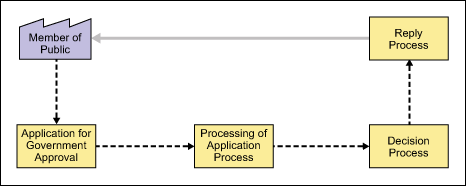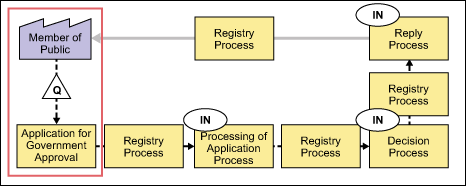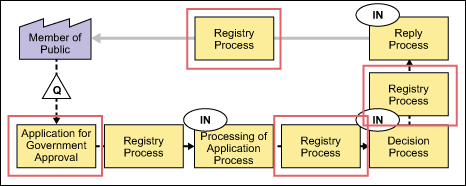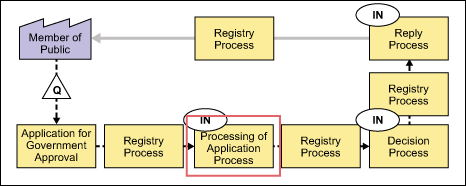
Lean government. The very idea sounds implausible. Even to the seasoned Lean practitioner, the idea of a Lean government sounds far fetched. Governments are traditionally seen as the epitome of bureaucracy, and the guardians of red tape, incomprehensible forms and endless queues. But there are workable Lean strategies for governments seeking to reduce waste and become more efficient. Eight are outlined here. Perhaps considering the eight ideas can spur government change agents to study Lean literature for potential improvement applications and in the longer run, start a Lean revolution in governments.
One-piece Flow
Consider 10 firemen passing a bucket of water from one to the next and ultimately to the fire. One-piece flow is achieved when the time it takes to pass a bucket from one fireman to the next is always exactly the same. If just one fireman is out of synch, the bucket flow will be disrupted and the entire chain will slow down.
The idealized goal of Lean is “one-piece flow,” also known as continuous flow. One-piece flow is achieved when all waste is eliminated from the value stream and all that remains is value-added work from the perspective of customers. In manufacturing, one-piece flow is an ideal and will always be an ideal because of fluctuations in customer demands plus the customer requirements for ever shorter delivery time forces the manufacturer to create partially completed or completed inventories. This type of manufacturing strategy actually creates waste because there is a need for storage and management of storage.
The interesting thing about Lean in government is this that one-piece flow operation is almost achievable here because there is really no requirement for in-process inventories. There is really no such thing as a partially finished job that is not the result of a customer order within government processes.

What would one-piece flow feel like in a typical government value stream? Consider typical government value stream (Figure 1). It has only four value-added processing steps from the customer’s perspective. Adding up all the value added processing time, it should take no more than three hours to obtain a reply. Lean government is a possibility.
Most governments and their value streams are not lean. Recall personal experiences trying to obtain a government grant, applying for an international passport, getting a drivers license or applying for a business permit. The typical experience is that is not that it took just three hours. More likely, it took more than a week. Nonetheless, it is possible to make government value streams lean. Here are eight ways:
No. 1 – Synchronization to Customer Demands
Most government value streams are not designed and synchronized to customer demands. In Lean manufacturing, the concept of Takt time, or beat time, is well understood but within most governments, this concept is unheard of. Takt time is a concept that is used to design work and it measures the pace of customer demand. It is the “available time for production” divided by the “customer demand.” The resulting number tells how fast each process step must operate to obtain one-piece flow.
Here is a government example: Suppose 300 citizens apply for a particular government permit in one working day and each working day consists of six working hours. The Takt time of this permit application process is 360 (6 x 60) minutes divided by 300 applications, which is equal to 1.2 minutes. This means that for these 300 applications to be processed within that one working day, every 1.2 minutes, one permit must processed to satisfy the customer demand.
The first permit will take the sum of all processing times to complete. Suppose there are 10 processing steps, each synchronized to Takt at 1.2 minutes each; then the first permit will take 12 minutes to complete. If one-piece flow is achieved, the next permit in the queue will leave the line exactly 1.2 minutes after the first permit and so on. To complete all 300 passports, it will actually take 12 minutes plus 371 (299 x 1.2) minutes, assuming one-piece flow operations.
To achieve this, the cycle time for each processing step must be 1.2 minutes or less to meet the demand. If any processing step takes more than 1.2 minutes, it becomes a bottleneck and work will get stuck at that point.
Government value streams are rarely designed around Takt time because the concept does not exist within most governments. Most public sector administrators do not understand how such a concept can translate into their environment. As a result, workforce allocations in government value streams are rarely rationalized around Takt time, resulting in over capacity in some parts of the stream and under capacity in other parts.
The main waste that this produces is work-in-process inventory (WIP) and the most visible manifestation of this is the ever-full in-tray. WIP kills one-piece flow because it disables a processing step from producing to Takt. But WIP build up is inevitable in any government value stream that is not synchronized to Takt. This is the main reason why a three-hour job needs more than a week for processing.
No. 2 – Understand Variations in Customer Demand
Synchronization to Takt generally requires two things – reducing the processing time of the step and establishing the correct staffing level. Suppose it takes six minutes to complete the application process at the government counter. To achieve one-piece flow at a Takt time of 1.2 minutes (as in the previous example) would require the manning of at least five counters (6 divided by 1.2 minutes). This assumes that one customer arrives into the stream every 1.2 minutes. Reducing the processing time to three minutes would allow the manning level to be reduced to three counters (3 divided by 1.2 minutes).

Of course, customers do not normally arrive at specific intervals. Most value streams experience significant variation in customer demand throughout the course of any typical workday. When the counter process is not synchronized to fluctuating customer demand, the familiar queue builds up. The typical government response to this problem is to build waiting areas and queue ticketing systems. This wastes not only expensive floor space (which taxpayers pay for) but more importantly it wastes the time of the citizens (customers). In some of the government value streams, this queuing can take up to hours.
This happens because fluctuations in customer demands typically are not monitored and also because government processes generally ask for more information than necessary at this first step, hence lengthening the processing time unnecessarily. If fluctuations in customer demands were monitored, the manning levels can be adjusted to match the requirements. This requires a workforce that is not only multi-skilled but also flexible – which bring up the next problem.
No. 3 – Create Work Cells
Most government value streams are organized around separate departments and functions. For example, to obtain a government approval for a permit, an application form probably has to flow through no less than three separate departments and/or functions prior to approval. The main reason is because people performing a particular type of function are normally grouped together in the same place.
Because of this, in most government setups, there is a type of internal post office system (registry process) that handles this movement of work from one part of the organization to another. From a Lean perspective, this creates waste of transportation and waiting. In some government processes studied, this registry process makes at most three to four collections and deliveries a workday. Collected WIP is sorted according to destination and delivered at the next allocated time slot. This causes two problems – a waste of time managing the movement of WIP between processes and, more severely, the creation of a natural batch of work that kills the one-piece flow capability of the receiving processing step.
The solution to this kind of problem is deceptively simple. Why not create a work cell where all the necessary value-adding processing steps and personnel are located together? This cuts out the need for the registry process, which should take out 50 percent of the total processing time and allow for smoother work flow because batching is no longer required. Implementing this kind of solution has proven to be remarkable difficult, largely because of the mindset that says jobs of the same function should be clustered together.

A key feature of Lean work cells is the training of multi-skilled and flexible workers. In a Lean work cell, the goal is to have all workers trained to a level where everyone can perform the job at every workstation. Since everyone can do every job, processes are never left half finished because the right person to do a particular job is not around.
No. 4 – Eliminate Batching Work and Multi-Tasking
Because work within most governments is organized around functions and not around processes, most government officials are required to multi-task. Most government officials, at all levels, participate in more than one value stream. They also have a whole host of other types of work that takes them away from the main value-creating work streams (normally meetings and more meetings). To compensate for this, most government personnel batch their work – often waiting for a minimum number of work items to build-up before working on them.
This strategy increases their personal efficiency. Obviously it is more efficient to process a batch of similar type of work within a compressed time slot than to process them as they arrive. This is because batching eliminates the need for several set-ups. (It is a common perception that administrative work requires no set-up time. Anyone who has done administrative work knows that this is not true. Every time a particular type of work is to be performed, the processing officer needs at least the time to adjust their mind to that new type of work.)
However, the whole batching problem and the time it takes can easily be eliminated if work is organized around work cells. But, as noted, work cells are not easy to create in governments.
No. 5 – Enforce First in, First out
In manufacturing, “first in, first out” (FIFO) is the normal rule applied to the processing order of work. If a company does not adhere to FIFO, much variation is added into the total distribution of processing time. For instance, in a last-in-first-out system, the jobs that come in last are processed quickly while the jobs that come in first take much longer to process.
Normally, in manufacturing value streams, there are FIFO lanes that prevent the FIFO rule from being violated. In government processes, jobs are often delivered into an in-tray. The in-tray creates a natural last-in-first-out effect leading to large overall processing time fluctuations. Large overall processing time fluctuations make the overall process less capable of meeting customer requirements as a whole.

The solution is once again the creation of Lean work cells, where work is pulled from one processing step to the next rather than pushed. If work is always pulled (that is, work is only ordered from the previous processing step when the operator is free), the FIFO rule will always be adhered to. Once again, the move from a push culture towards a pull culture is difficult for most governments. The normal government manager’s mindset is to load people with more work than they can do so as to ensure that they are always occupied.
No. 6 – Implement Standardized Work and Load Leveling
Related to first-in-first-out issue is the lack of understanding and application of standardized work within government value streams. Even in highly repeatable work, it is fairly common to find different government workers performing similar tasks using slightly different methods and time. Because work is not standardized, there is no basis for evaluation and improvement. Often, the “best” workers are loaded with more work because they work faster and more efficiently than other workers. Overall and over time, this encourages government workers to slow their pace. They learn that additional work will be pushed to them once they complete a certain amount of their current workload. Hence, production is paced according what is deemed reasonable by the supervisor and not paced according to customer demands.
| Table 1: Accumulation of WIP Lengthens Flow Time | ||||
|
Day |
|
Processed |
WIP |
Flow Time |
| Monday |
300 |
100 |
300 |
3 |
| Tuesday |
300 |
100 |
500 |
5 |
| Wednesday |
300 |
100 |
800 |
8 |
| Thursday |
300 |
100 |
1,100 |
11 |
| Friday |
300 |
100 |
1,400 |
14 |
| Monday |
300 |
100 |
1,700 |
17 |
| Tuesday |
300 |
100 |
2,000 |
20 |
| Wednesday |
300 |
100 |
2,300 |
23 |
| Thursday |
300 |
100 |
2,600 |
26 |
| Friday |
300 |
100 |
2,900 |
29 |
| Monday |
300 |
100 |
3,200 |
32 |
| Tuesday |
300 |
100 |
3,500 |
35 |
| Wednesday |
300 |
100 |
3,800 |
38 |
| Thursday |
300 |
100 |
4,100 |
41 |
| Friday |
300 |
100 |
4,400 |
44 |
| Monday |
300 |
100 |
4,700 |
47 |
| Tuesday |
300 |
100 |
5,000 |
50 |
| Wednesday |
300 |
100 |
5,300 |
53 |
|
Thursday |
300 |
100 |
5,600 |
56 |
| Friday |
300 |
100 |
5,900 |
59 |
No. 7 – Do Today’s Work Today
Most government officials do not believe that work that arrives today can be finished today. They are correct to believe so because the way the work streams are currently set up do not allow work that arrives today to be complete on the same day. Over time, this cultivates a mindset that says, “We can always do it tomorrow.”
What many governments may not realize is that customer demands remain largely constant from day to day. That is, the number of people applying for a particular permit each day tends to average out. If about 300 apply on Monday, a similar number are like to apply on Tuesday. If the government agency only managed to process 100 out of the 300 applications on Monday, there will be about 500 applications waiting to be processed on Tuesday (200 from previous day).
The accumulation of WIP has the effect of lengthening the expected flow time of the job as shown in the table. When the WIP is only 300, one can reasonably expect the permit to be processed within three days. However, by the end of the month, with WIP levels at 5,900, one can only expect their permit to be processed after 59 days. And the problem continues to grow.
The only way to stop this is to design value streams that can complete what comes in by the same day.
No. 8 – Make the Value Stream Visible
Last but certainly not least, the easiest way toward Lean governments is to teach government officials value stream mapping. Unlike manufacturing, there is no visible line in government. In fact, most people working in government do not even know they are part of a larger value stream. They think largely in terms of their job and their function. Making the value stream visible through value stream mapping exposes non-valued steps, time wasted by transportation and WIP, excessive process variation caused by non-standard work processes and production rules, waste caused by rework, waste caused by excessive checking and more. When a value stream map is created for their operations, many government officials are surprised by how much time and money is wasted. They also are surprised by how easy it is, once the value stream is visualized, to produce Lean government value streams.